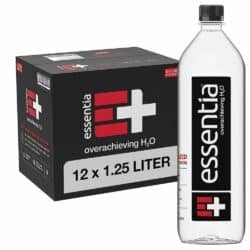Is MiO Healthy (Nutrition Pros and Cons)?
In this blog post, I’ll review the question of whether MiO Liquid Water Enhancer is healthy or not. Find out this product’s nutrition pros and cons and some better options you can consider.

MiO Water Enhancer Drink Facts
MiO is a liquid concentrate that enhances water by adding flavor, electrolytes, vitamins, and energy-boosting ingredients without adding calories, carbohydrates, or sugar.
The American food company Kraft Heinz Company produces MiO Water Enhancer.
The product’s main target market is people who want to drink water for hydration but don’t enjoy the taste of it and want to avoid added sugars or calories. It is also aimed at people looking for healthier alternatives to sugary beverages or those with dietary restrictions.
MiO has four product lines in a variety of flavors:
- MiO Original
- MiO Vitamins
- MiO Electrolytes
- MiO Energy
The ingredients of MiO Water Enhancer vary depending on the product line and flavor but typically contain a small amount of sodium, water, natural and artificial colors and flavors, sweeteners, and preservatives.
Some variations contain taurine, citric acid, potassium citrate, stabilizers, and emulsifiers to maintain the product’s consistency and flavor profile. The energy-boosting variations contain ingredients like guarana, ginseng, and caffeine.
MiO Water Enhancer Drink Ingredients
MiO Water Enhancer is free from calories and sugar and is artificially sweetened. It contains highly processed and chemical ingredients that may cause health problems for some people.
Let’s examine some of the major ingredients listed on the nutrition label of mio flavors so you can decide if this product is good for you or not.
Sodium Benzoate
Sodium benzoate is a chemical that stops bacteria, mold, and yeast from growing.
According to the FDA, manufactured foods may contain up to 0.1% of this chemical because it does not accumulate in the system and should pass through the body in around 24 hours.
However, according to scientific studies, it can impair motor function and memory. It’s also important to note that sodium benzoate consumption has been associated with increased ADHD symptoms.
Potassium Sorbate

Potassium sorbate is a chemical preservative labeled as “generally safe” by the Food and Drug Administration (FDA) because it does not accumulate in the body. It’s worth noting that the European Food Safety Authority has placed a limit on the acceptable daily intake of this chemical.
There are two major health concerns with potassium sorbate.
The first is how it is manufactured; during production, there is a risk of cross-contamination with hazardous substances like arsenic, lead, and mercury.
The other risk is that it has been associated with allergic reactions, especially on the skin.
Citric Acid
Citrus fruits contain natural citric acid; some food manufacturers who want to add a citrusy flavor to products use this.
Although it is a natural type of flavoring, it is not regulated, so it’s impossible to know if the manufacturer extracted it using safe methods.
Another potential drawback is that citric acid is corrosive, and excessive use can cause dental problems over time.
Non-Nutritive Sweeteners
MiO is sweetened with sucralose and acesulfame potassium to offer a sweet taste. Both are highly processed chemical sweeteners and don’t have any nutritional value.
Both sweeteners, especially acesulfame potassium, have been linked to an increased risk of cancer.
Research has also shown that these ingredients cause chronic inflammation and can significantly increase the risk of chronic diseases like cardiovascular disease, diabetes, and obesity.
Another health concern is that non-nutritive sweeteners change your gut microbiome and can harm your gut health, causing uncomfortable side effects like digestive problems.
Over time, gut health problems can lead to chronic disease.
Artificial Flavors
Highly processed, chemical ingredients like artificial flavors are generally unhealthy and can cause health problems because of toxicity.
Artificial flavors can cause food sensitivities and may contain hazardous substances like solvents, depending on how they are manufactured. Since no regulatory body is responsible for this, there is no way of knowing whether it’s truly safe to consume.
Taurine
Taurine occurs naturally in meat, eggs, and fish. It helps maintain muscle and supports heart health. You should receive a healthy level of this amino acid if you eat these foods.
When artificially added to certain foods or food products, taurine can cause problems like altered neural functioning and interfere with the efficacy of medications.
Artificial Colors – Red 40 and Yellow 5
Depending on the flavor variation, MiO contains artificial colors like Red 40 and Yellow 5, which can have severe health risks and can potentially cause allergic reactions like asthma and hives.
Various studies have suggested that red food dye is unsafe for consumption. It can chemically change the brain and cause inflammation and allergic reactions while depleting essential minerals like zinc and iron.
This study linked red food dye with bowel disease, and this study is one of many that explored the link between red food dye and ADHD.
Additionally, Red 40 contains benzidine, which is a known carcinogen for humans and animals. It is crucial to avoid this ingredient, or at the very least, consume it with extreme caution; it is unhealthy and can have a negative effect on health.
Like Red 40, Yellow 5 also contains the carcinogen benzidine. Besides containing a cancer-causing ingredient, Yellow 5 can also cause DNA damage in blood cells. Try to find health alternatives.
Nutrition Pros
This product makes it easier for people who don’t like the taste of water to stay hydrated. Mio products may help certain people get enough water.
It does not contain added sugar or high fructose corn syrup and has zero calories and carbohydrates. This product may be a good alternative to sugary drinks or energy drinks.
Nutrition Cons
MiO is a highly processed product with practically no nutritional value and several potentially harmful chemical ingredients. It contains artificial sweeteners, artificial colors and flavors, natural flavors, and preservatives.
It’s important to note that while MiO Water Enhancer offers a convenient way to flavor water without adding calories or sugar, individuals with specific dietary restrictions or sensitivities should carefully review the ingredients list to ensure that the product meets their needs.
Additionally, moderation is key when using any flavored water enhancer or highly processed product like MiO. Over time, it may adversely affect your health, especially if you consume large quantities.
People concerned about health may want to consider avoiding mio water enhancers and consider health alternatives such as herbal teas, homemade sports drinks, or just adding natural ingredients like lemon juice to water.
FAQs
Yes. Many of the ingredients in MiO Water Enhancer are highly processed chemicals that can cause health problems. Some people are more sensitive to non-nutritive sweeteners and artificial flavors and colors than others, but all these ingredients can be considered unhealthy, especially when consumed long-term.
Yes, MiO Water Enhancer contains sodium, calcium, iron, and various B vitamins. Some product variations contain ginseng and guarana, which have some health benefits. However, some of the B vitamins can have adverse effects.
Too much vitamin B6 can lead to losing feeling in the legs and arms, and too much vitamin B8 can cause dizziness, headaches, insomnia, digestive problems, and nausea. It’s best to get your vitamins and minerals through real food sources instead of risking overdosing on them, especially B vitamins.
Yes, most MiO Water Enhancer product lines contain preservatives and artificial colors with various adverse health implications. This includes sodium benzoate, potassium sorbate, and the highly controversial Red 40 and Yellow 5 artificial colors and food dyes.
MiO Water Enhancer can help make drinking water more accessible for people who dislike the taste of plain water. However, plain water is a healthier choice because it does not contain unhealthy ingredients like preservatives or artificial flavors, colors, and sweeteners.
Don’t Miss These Beverage Reviews
Conclusions
Although MiO Water Enhancer can help people who don’t like plain water hydrate, the potential health risks of the other ingredients are likely not worth the potential flavor improvement.
MiO is a highly processed product that contains various potentially dangerous chemicals, including artificial sweeteners, colors, and flavors. Instead of consuming this product to hydrate, drink regular water. You can enhance it with a few fruit slices or make a delicious and refreshing herbal tea infusion.
Don’t forget to join my newsletter list to get exclusive clean eating recipes and tips. The newsletter is 100% free with no spam; unsubscribe anytime.
About the Author: Carrie Forrest has a master’s degree in public health with a specialty in nutrition and is studying to be a holistic nutritionist. She is a top wellness and food blogger with over 5 million annual visitors to her site. Carrie has an incredible story of recovery from chronic illness and is passionate about helping other women transform their health. Send her a message through her contact form.
Note: this post is for informational purposes only and is not intended as medical advice. Please consult your healthcare provider for recommendations related to your individual situation.




















